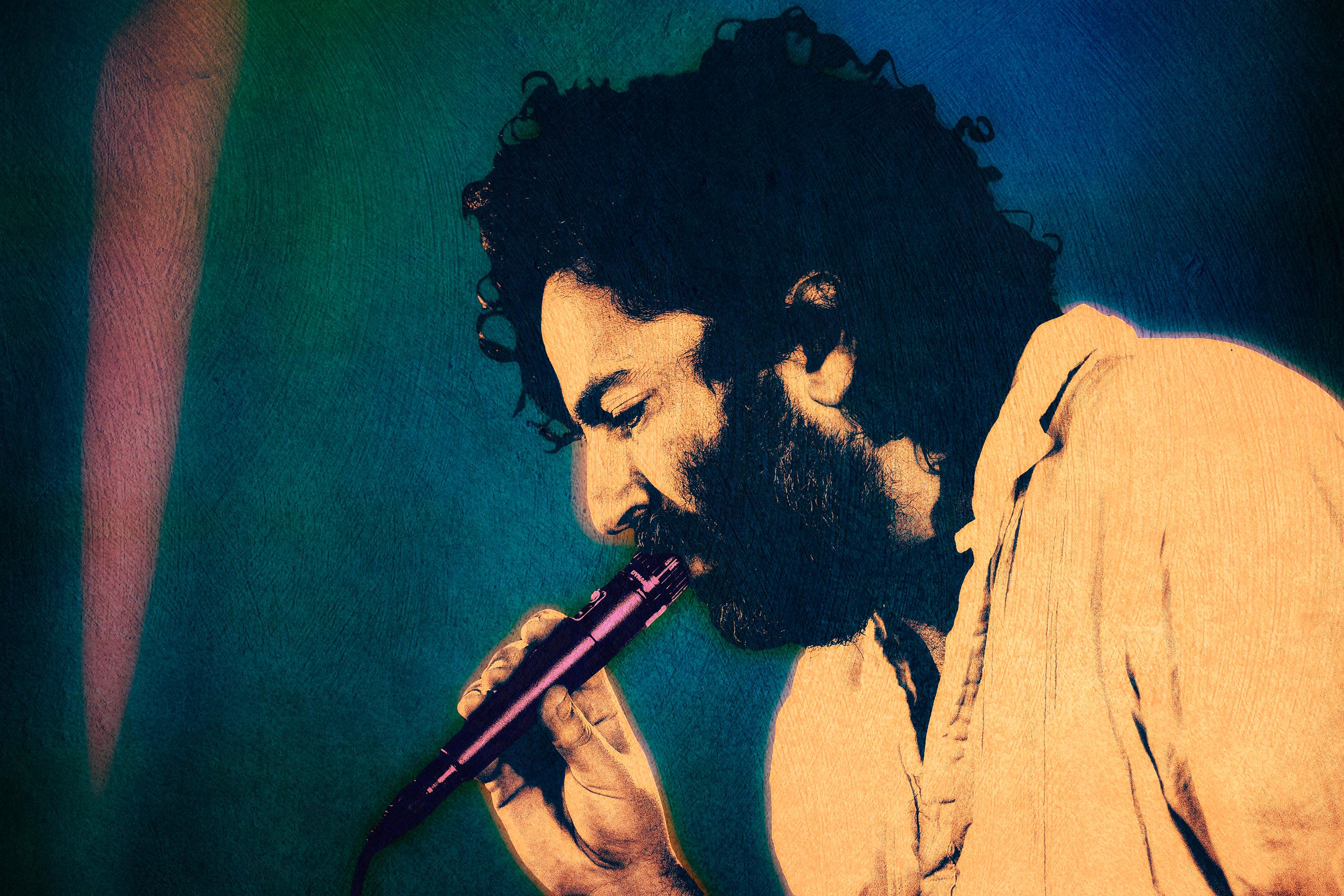
Midway through the luscious and foreboding Have We Met, Dan Bejar’s 13th full-length album under the name Destroyer, we encounter a song called “The Television Music Supervisor.” It’s a menacingly lovely ambient wisp of a thing, drumless and weightless, the synths droning and the keyboard keys plinking and the bloops blooping as Bejar sings, with an almost comical gravitas, the following:
The television music supervisor says
“I can’t believe what I’ve done”
“I can’t believe that I said what I said”
He does not clarify this, nor would you want him to. (Right?) The drones and bloops intensify; in lieu of clarification, Bejar makes an offhand reference to “famous novelist brothers Shithead Number One and Shithead Number Two.” Nobody in rock ’n’ roll, any era or any style, has ever made profanity sound more intellectual, more profound. It’s a perfect song that is also barely a song at all.
Destroyer qualifies vaguely as “indie rock” and has flourished across a 25-year span in which that term has been rendered meaningless; Bejar, a Vancouver native and former luminary for the Canadian power-pop supergroup the New Pornographers, has got a squeaking-gate croon, a surrealist wit, and an alluringly exhausted approach to ennui and sensuality. With a revolving cast often corralled by producer John Collins, he’s made mellow yacht-rock albums, spry glam-rock albums, gloomy soft-rock albums, and profound folk-rock albums. Destroyer’s Rubies, from 2006, is my favorite, an extraverbose and painstakingly ramshackle celebration of all the ecstasy lurking just beneath all that ennui; 2011’s less verbose and way chiller Kaputt made him as successful and as visible as a guy like this is comfortable getting, though any discomfort only adds to the allure.
Have We Met, like the best Destroyer records, serves up pieces of all the other Destroyer records: There are gnomic catchphrases (“Just look at the world around you / Actually no, don’t look”), spacey ballads (the closer, “Foolssong,” is especially lovely), just-pop-enough New Wave hooks (see “Crimson Tide” and “It Just Doesn’t Happen”), and lots of elegant melancholia both musical (the forlorn electric guitar of “Cue Synthesizer”) and lyrical (“Your fortress of solitude’s no contest when you’re staring at oblivion!”). “Dan Bejar Serenades the Apocalypse,” is the way a delightful recent Pitchfork feature put it, wherein the bard raved about Mad Max: Fury Road and boasted, perhaps self-deprecatingly or at least tipsily, of having more ambition than his fellow post-indie-rock superstars.
I talked to Bejar on the phone in mid-January about hope vs. despair, understanding (in the lyrical sense) vs. catharsis (in the emotional sense), and Ariana Grande. Here are excerpts from our conversation.
I was taken immediately by “The Television Music Supervisor” in particular, and I was curious how much personal interaction you’ve had with those sorts of people, and what first compelled you to write a song about those sorts of people.
I have zero interaction. The whole thing is a fantasy. It’s pure invention. I don’t even really know why that phrase came to me—I was walking down the street, and the fact that it came with the melody attached is like, Whoa, I’ve got to make this into a song. Normally I’d be pretty scared away by that kind of super-specific language, and I think the fact that it’s so specific made me want to keep the music extra dreamy, extra abstract.
I’ve always thought of it as someone at the end of their life looking back, a figure of power looking back on their misdeeds. Someone said that to them, it seemed macabre, almost like a horror story, which I think is really cool. I hadn’t thought of that. Like a Kafka short story or something like that, a weird bureaucratic figure who enters some kind of nightmare state.
Do you as the songwriter know what the television music supervisor said and did, and you just choose not to specify? Is there generally information you’re withholding in your songs that would explain them a little better, or is that the wrong way to approach this?
No, I mean, I think if you know what the television music supervisor had done, then that’s a waste of a song. I feel like it has to be ... what if a person happens to be a television music supervisor, and they’ve done something truly terrible, and it’s more like a murder mystery? Or what if they’d just licensed a bunch of shitty music for a bunch of dumb shows, which is a far lesser crime? It’s good to not know which one. But what you do need to do is sing it with a certain amount of gravitas, right away, whether they’ve done nothing but their job, or whether they’ve done truly unspeakable, horrific things.
Your music has made it onto a few TV shows so far, but I don’t know if Destroyer works very well as background music, just because whatever you’re singing is going to be way more interesting than whatever the people on TV are saying or what’s happening. Is there something appealing or subversive about sneaking your music into a random Netflix show or whatever, or is that an entirely financial decision?
I’m really not too hung up on it. It’s just like a thing that exists—that song is definitely not a rant against songs being used in shows or anything like that. I’m not passionate about, Oh, this is wrong, or, this is right. Some Destroyer songs have ended up in places. I’ve been told, and I don’t know much about that business, I think when Kaputt came out and it had more traction, it seemed to exist in some kind of mainstream world in comparison to other Destroyer records, but no one “bit” at those songs, as they say, to license them.
If I was making a one-hour teen drama, there’s no way I could clutter up my scenes with this weirdo singing a song.Bejar
Someone named Ashley said to me in an email, like, “Well, Destroyer’s not exactly a slam dunk in the licensing world. You use too many words, and the words that you use are weird, and your voice is weird.” So that’s a three strikes, you’re out kinda thing: too many words, too many weird words, and speaking of weird, your voice is weird. I can’t argue with that. If I was making a one-hour teen drama, there’s no way I could clutter up my scenes with this weirdo singing a song.
I think what a lot of people love about Destroyer is how overwhelming this music can be, just this barrage of great lines and great images, but by design it’s not always terrifically clear what you mean or what you’re feeling. Do you wish that you were understood to a greater degree than you are, or is part of your goal still to leave people a little perplexed?
I don’t want to leave anyone perplexed. I want them to be—I don’t want them to understand, I don’t want them to approach the words like this is code that they have to crack. What I want is for them to have an emotional response, which is what I’ve had when I’m singing. Any version of a Destroyer song where it doesn’t seem like I have some kind of investment in the words is just a failure in my book. I have an emotional reaction to language, and that’s what makes me write it down in the first place, and then twofold, that’s what makes me want to sing it. I hope at some point that emotional reaction to those lines and those melodies is infectious somehow.
I laugh every time at the line, “Been to America, been to Europe, it’s the same shit,” but “Cue Synthesizer” as a whole makes me worry that you don’t absolutely love touring as much anymore.
I don’t think so. I’ve never been one for constant travel, but I do like getting onstage and singing more than I ever have. I think when I wrote those lines, the fact that I felt the need to repeat it twice, I really wanted to ram the point home that the world seemed like it was erasing itself. Like the distinctions get obliterated, just because in a capitalist world, that’s the endgame, just like the homogeneity of these things. It’s not like I was actually traveling through Europe and traveling through America and thinking that it all looks the same: Even within America, America isn’t going to make sense as a country, it’s so different within itself. It’s more just what these places seem up against, and if we’ve ever felt like we’re up against something, it feels that way right now. But what these places are up against feels like kind of the same thing.
Kaputt stands apart for people a little bit in your catalog—it showed up on quite a few Best of the 2010s lists that I saw. Does that record personally represent any sort of high point for you, either artistically or in terms of the attention that it got?
It’s kind of like a scam that actually worked. We went in with, Let’s make a record that you can play at a café, play at a dinner party or in a waiting room, that can exist in a public space. Unlike all these other records I’ve made, where you’re going to get someone asking to turn it off or there’s going to be some reaction. The other ones before that had so many words, this constant barrage of words kind of spitting at you. And that was not the Kaputt vibe.
I thought it would sound like a record that could get played in a café, but I didn’t think it would actually get played in cafés. And then it did.Bejar
I didn’t think it would actually work: I thought it would sound like a record that could get played in a café, but I didn’t think it would actually get played in cafés. And then it did. It had a broader appeal, which is not something that you really have any control over, or something that I’m trying to cultivate. I think most of the songs were written as kind of like lullabies, a lullaby melody during the early fatherhood days for me, and I can’t imagine finding my way back to that place.
There’s been a big push for artists to get more political or for their albums to speak more explicitly to the times, and lately that’s mutating into this simpler idea of whether an album is expressing either Hope or Despair, and it’s usually one or the other. Is that binary useful to you at all, and does Have We Met swing strongly in your mind in either direction?
Yeah, I mean, despair is the words, and hope is the music. I think that’s usually how it’s always worked with Destroyer. There’s been this dissonance between words that are pretty downbeat or dark or melancholic, and then the music is kind of more buoyant. Have We Met I don’t think is any more or less political than any other Destroyer record. I think they’ve all been political in their way, but if there’s despair in the writing, it seems maybe more explicit than usual.
Right, like I was pretty impressively disturbed by just the image of “The Grand Ole Opry of Death,” for example. It made me wonder if you set out deliberately to make “The Darkest Destroyer Album Yet.”
Yes, that was my intention. It’s never been put to me like that, or getting a succinct response like that. But the fact is that when John and I first started talking about making the record, we were just, It’s got to be dark. We have to make it dark. Just playing off the demos that I sent him, I thought that was the direction to go. I don’t know why I went toward that. I feel like that’s been kind of a trajectory in the last two or three records, but this one seems to be kind of the apex.
Is there a Destroyer album in retrospect that strikes you now as particularly bright or hopeful or even joyful? Rubies, at least for me, is still a record that makes me instantly, extremely happy.
Yeah, I think you’re right. I haven’t really thought about it, but I think that one is—I’m trying to remember how the songs got written. I feel like it’s probably my favorite record, in that I’m just really kind of luxuriating in the writing, just getting off on just blasting out images, and just playing with words, and the band and music came together in a very natural and easy way, and it was really easy to sing. You’re right. There’s a melancholic kind of wandering vibe to a lot of the Rubies songs. But it’s different, it’s lighter. Definitely lighter than what came in the next decade.
You said recently that you thought you were more ambitious than Arcade Fire or Spoon, and I guess I’m less interested in any rivalry there—
[Laughing] When did I say that?
It was in the Pitchfork thing.
[Still laughing.] Ah, shit.
I know that writer, and I love that guy, and I love the thought of the two of you together, just drinking beers and—
Yeah, that must’ve been on the third drink. I wouldn’t mention those bands—it must’ve come up in some other context. Maybe I was trying to make a distinction between ambition and scope in artistic practice, and them being two different things. But that just seems like something some drunk guy would say. Maybe he was talking about some kind of self-deprecation, some kind of modesty? I don’t know, something must’ve prompted me to say that. I don’t know what it was.
I was just curious what ambitious means to you, what ambitions you have for Destroyer in general, and whether you generally meet them.
No, I never do. I mean, my only ambition is to make really cool records and then get on stage and play cool shows. And as far as the first thing, I like all of them, but there’s always stuff that I feel misses its mark, or, I don’t know, I assume everyone feels that way. You’d have to tell me if people that you’ve talked to say, “Oh, man, I really nailed that album. It is perfect. It is the embodiment of everything that I meant to do.”
That doesn’t happen, no.
That can’t happen. So I kind of like the idea of just noble failures.
The other thing from that Pitchfork article is I’m really taken by the idea of you just sitting down and watching Mad Max: Fury Road. What drew you to that movie initially?
I’ll be honest: I wasn’t expecting to love it so much. I don’t have that much invested in the franchise—I liked some as a teenager. But the whole thing visually just struck me as just like a poem, just a tone poem. A constantly moving tone poem. It’s just incredibly artful, and I react to it in the way that I react to any movies that I love—like, struck by the art of it.
Pretty loud tones in this case, I guess.
Yeah, yeah. Broad. I would say broad gestures. There’s beautiful, amazing, quiet, ambient moments in that film, as well as just like this kind of sensual barrage that we associate with it.
Are you typically an action-movie guy, an apocalypse-movie guy? Is this an outlier?
This is an outlier, I think. I’ll watch some. I liked all the Australian kind of gutter Shakespeare in Fury Road. There’s all sorts of details to it that you don’t really find in other action movies. It just seems like a really expensive art show to me. Also, it’s really Australian. Like it doesn’t seem like a movie that America would make.
You’ve talked in the past about pop music, about Taylor Swift, about your total disinterest in that sphere, and I’m wondering if that still holds true, or if the fact of your daughter now being a little more in the pop-music target audience has changed your perspective or at least your exposure to that kind of stuff.
It’s true that probably through her, I’ve developed some sort of soft spot for some Ariana Grande. But as far as what I actively put on as a listener, it hasn’t really changed. You know, I think I was just too late to it. I don’t want to, like, age myself or handcuff myself, but like so many of us, I stopped listening to the radio when I was 14, and just for me to dive back in and make sense of it when I’m 47, I don’t know the mood, I feel like I just don’t speak the language. Not saying that pop music is for babies or for kids, but I feel like the whole scene of it just being like a text, like any other text you appreciate, I don’t have the tools.
What is it about Ariana Grande?
I mean, I’m not sure if I just have Stockholm Syndrome—she’s just put it on so much, now I’m just inside of it. But definitely there’s something about when Gloria started playing the Sweetener record that I was like, This, for some reason, I can hear this again and again, and I’m not having a problem with it. The most glowing review possible.

